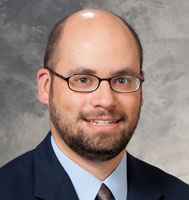
In 2018, Department of Pediatrics Assistant Professor Christian Capitini, MD, received his first R01 award from the National Institute of Health’s (NIH) National Cancer Institute to lead a preclinical project aimed at strengthening the pipeline of immunotherapy treatment approaches for neuroblastoma, the third most common type of childhood cancer.
He is carrying out the five-year, $1.75 million project with co-investigator Sean Fain, PhD, a professor in the Department of Medical Physics and director of its Image Analysis Core Facility, magnetic resonance imaging (MRI) and CT Imaging.
Using a mouse model, Dr. Capitini’s team is combining two immunotherapeutic approaches for neuroblastoma treatment.
First, they transplant donor bone marrow cells into tumor-bearing mice and administer an antibody (the immunocytokine hu14.18-IL2) to strengthen the new immune system’s capacity to attack the tumor. Then, they infuse immunologically activated natural-killer (NK) cells from the donor to further target and attack the tumor.
The goal of the combined approaches is to redirect the new immune system to eliminate the neuroblastoma tumor, while reducing the risk of graft-versus-host disease (GVHD), a life-threatening immune reaction commonly seen after bone marrow transplant.
In addition, the team is using a new type of real-time imaging to track the NK cells’ progression through the body. They label the NK cells with fluorine-19, a non-radioactive isotope of fluorine, and then detect them with an MRI coil developed with Dr. Capitini’s colleagues in the Department of Medical Physics to see if they find the tumor.
This imaging technique is a less invasive and faster way to detect injected NK cells than drawing blood or performing a bone-marrow biopsy. And because fluorine-19 isn’t radioactive, the labeling won’t decay as it would with a positron emission tomography (PET) scan.
The project dovetails with similar immunotherapeutic treatment approaches for neuroblastoma currently in clinical trials at UW Health. Department of Pediatrics Associate Professor Mario Otto, MD, PhD, leads a Phase I trial in which clinicians first deplete the T-cells known to cause GVHD from donor stem cells before transplanting them into the patient. And Department of Pediatrics Professor Kenneth Desantes, MD, leads a new Phase I trial that combines NK cells from a half-matched donor, typically a parent, with an antibody to better target a neuroblastoma tumor prior to transplant.